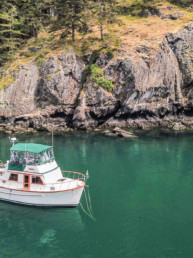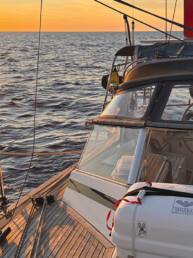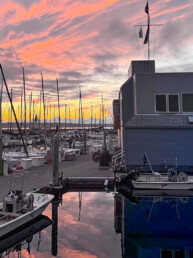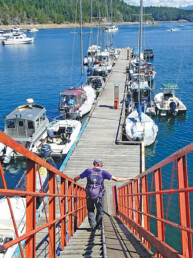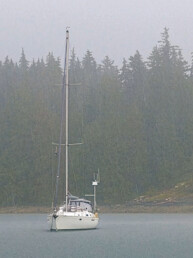Port Townsend Maritime Academy Skills Center
When Kelley Watson convenes her high school classes in Port Townsend, it might be in a classroom with a white board with tables and chairs. Or not.
More likely, it will be in the cockpit of a sea kayak, or rowing a 25-foot longboat, or on the deck of a century-old wooden-hulled schooner.
Watson’s Maritime Skills Academy is headquartered on Port Townsend Bay, where, five days per week, 18 high school juniors and seniors learn skills ranging from outboard motor maintenance and at-sea rescues to navigation and, yes, English composition.
 Halfway through its first year, the academy is a rare, if not unique, collaboration between the Port Townsend Public School District, West Sound Technical Skills Center (a Bremerton Public Schools program), and the Northwest Maritime Center on the Port Townsend waterfront.
Halfway through its first year, the academy is a rare, if not unique, collaboration between the Port Townsend Public School District, West Sound Technical Skills Center (a Bremerton Public Schools program), and the Northwest Maritime Center on the Port Townsend waterfront.
And that alliance is rooted in some ancient wisdoms promoted by yet another seemingly unrelated institution – Outward Bound, which has been leading young people on expeditions of self-discovery for some 60 years.
It all comes together in Kelley Watson, a trim woman with shoulder-length hair, an easy smile, a teaching certificate and a 100-ton captain’s license. She doesn’t just lead the academy, she personifies it.
Watson grew up in Beaverton, Oregon, spending summers with friends and relatives on Puget Sound, where she learned to paddle a kayak. She went on to college at Western Washington University, and applied for a summer job at YMCA Camp Orkila, where she found herself leading kids on kayak trips through the San Juans.
“I was hooked,” she recalls. “By the end of the summer, kayaking was like walking. It was what we did all day, every day.”
That led her to a job with Outward Bound, where she led young novice paddlers on even more challenging expeditions initially on the Great Lakes, then on the Sea of Cortez, the coast of Maine, and in Patagonia, Chile.
At times, she supplemented that job by working on fishing boats in Southeast Alaska and Bristol Bay. “For a while, I worked both jobs – fishing the summer in Alaska, then Outward Bound in Patagonia in the winter, back and forth. I felt like I was living a charmed life, working with incredible people in incredible places.”
That sense was integral to the Outward Bound mission, she says. “You learn that you can do the hard things. You can have a wild dream, and find a way to do it.”
Watson’s dream was to find a way to make a living doing what she loves—on boats. So she started working toward maritime credentials, earning her 100-ton license with a sailing endorsement.
Then, some 20 years ago, a friend invited her to visit in Port Townsend. “He warned me that, if I came, I’d never leave. And I guess he was right.”
Initially, Watson lived in a tent on Marrowstone Island, working at the brewpub between Outward Bound expeditions. That led to seasonal jobs working with kids on the schooner Adventuress, where she encountered more Outward Bound veterans.
You learn that you can do the hard things. You can have a wild dream, and find a way to do it.
Kelley Watson
About that time, a Port Townsend group was promoting the idea of a nonprofit maritime center on an empty waterfront site alongside Point Hudson. Somehow, they raised millions, cleaned up the site and built a handsome $15-million complex. And, to fill that building with programs, they hired Jake Beattie, himself an experienced Outward Bound leader.
Beattie, in turn, has lured more experienced Outward Bound hands, and they started coming up with ideas for the maritime center that are reflective of their Outward Bound backgrounds. One of those ideas was the bold – some would say crazy – concept of the Race to Alaska (R2AK) with essentially one rule: no engines allowed. They recruited sponsors, lured disgustingly-fit sailors, rowers, and paddlers from across the country, and have staged annual races that draw attention from around the globe. Just to stay in character, they followed up with the Seventy-48, a 70-mile race from Tacoma to Port Townsend with two rules: no engines and no sails. Paddlers and rowers only. Watson was one of them, paddling the course just to do it.
But the heart of the Maritime Center remains in the maritime education programs. Several years ago, Beattie got together with David Engle, then the Port Townsend schools superintendent, and started working on the idea of a maritime skills academy. And to make it happen, they turned to Watson, asking her to draft a curriculum.
“The timing was perfect.” She recalls. “I had been student teaching and working with girls through the Girls Boat Project at the Northwest Maritime Center. It was a job where I could combine those areas of experience.”
The result was a 19-page document which breaks down to six broad categories: vessel operations, emergency response and safety, maintenance and repair, maritime career pathways, physical training, and English language arts. In each area, Watson assembled a detailed list of competencies. For vessel operations, for example, students should be able to command and crew aboard small vessels, navigate and follow rules of the road, properly handle lines, read and decipher weather and tide charts, use shipboard electronics, and much more.
And it’s about focusing education on the whole person, trying to unlock human potential.
Jake Beattie
With each new set of skills, students are required to write an essay about what they have learned.
The school district and maritime center teamed up with West Sound Technical Skills Center, a Bremerton Schools program, which broadened the academy’s base to extend from Bremerton and Gig Harbor to Port Townsend and Whidbey Island. Last fall, they launched the program with 18 teenaged boys and girls from Port Townsend, Chimacum, and Whidbey.
Watson’s salary is paid by the schools, since public funds follow the students. But the Maritime Center provides the boats and expertise.
Beattie is enthused. “Career-based education gets a pretty bad rap,” he says. “But the skills academy is an example of how it can and should work. Some of these kids will go on to well-paying maritime careers, and others won’t.”
Some may take a year off and try taking a maritime job, Beattie says. But the world has changed, and people are far less likely to stay in the same job for an entire career. The academy provides an alternative pathway for people to be successful.
What Watson learned from her Outward Bound experience is that young people learn in different ways. Some learn well in classrooms, others learn by doing.

“Skills centers are misunderstood and underutilized,” she says. “And traditional schools are often hemmed in with a more conventional view of how to achieve goals. It may involve classroom learning and four-year degrees, and it may not.”
It is no accident that the Maritime Skills Academy and the Maritime Center are infused with values long expressed and promoted by Outward Bound.
“It’s about experiential learning,” Beattie says. “It’s about high ideals of service. And it’s about focusing education on the whole person, trying to unlock human potential.”
That’s nothing new. Young people have long gone to sea to learn about the world and about themselves. Out on Port Townsend Bay, Watson and the Maritime Skills Academy are providing a platform for another generation to do the same.
This article was published in the January 2020 issue of 48° North.
For more information about the Maritime Skills Academy, contact kwatson@ptschools.org and visit www.westsoundtech.org.
Ross Anderson
Ross is a retired journalist who lives in Port Townsend. He is a longtime supporter of and volunteer at the Northwest Maritime Center, and his grandson is a student at the Maritime Skills Academy.

